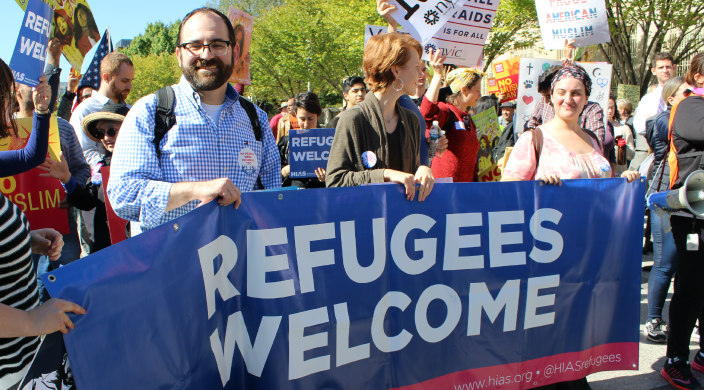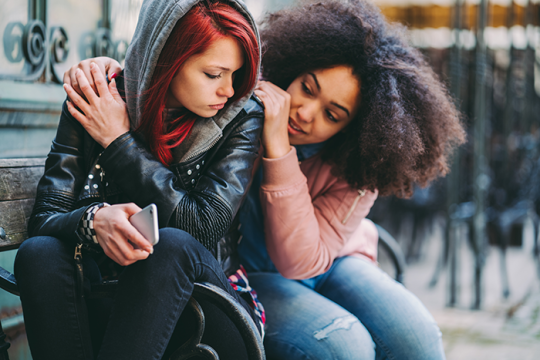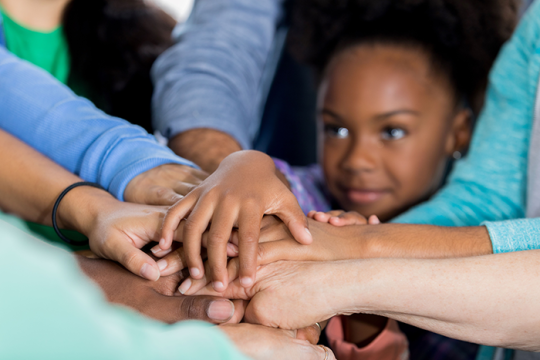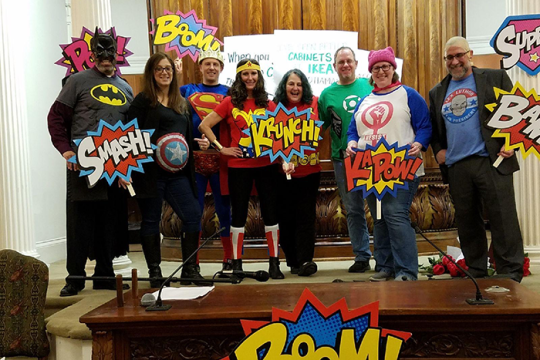
Rabbi Lee Bycel is the Sinton Visiting Professor of Holocaust, Ethics and Refugee Studies at the University of San Francisco. He served as dean of the Hebrew Union College in Los Angeles from 1982-1997.
His visits to refugee camps in Darfur, Chad, South Sudan, Rwanda, Kenya, Ethiopia, and Haiti led to his writing Refugees in America: Stories of Courage Resilience and Hope in Their Own Words (Rutgers University Press). Proceeds will benefit two refugee settlement organizations: HIAS and International Rescue Committee. More information can be found at refugeesinamerica.com.
I sat down with Rabbi Bycel to learn more about his humanitarian activism and the making of his book, which Madeleine Albright has rightly hailed as “timely, important, and deeply moving.”
ReformJudaism.org: You spent Yom Kippur of 2004 in Darfuri refugee camps in eastern Chad. What impact did that experience have on your life and work?
Rabbi Lee Bycel: I had no real notion of what refugee camps were like until I visited three camps at the invitation of the International Medical Corps. I heard first-hand stories of the brutality inflicted upon women who had been raped by the Janjaweed and upon men who lost everything they ever had. Being there allowed me to bear witness to the suffering of these desperate people.
What does “bearing witness” mean for you?
It means being present, listening, and observing where human suffering is taking place. It means acknowledging my own prejudices. It means integrating what I am experiencing into who I am, making it part of my life, and most importantly, taking actions to improve the lives of these people.
Refugees in America tells the stories of six men and five women, ranging in age from 24 to 94. Why did you choose to focus on these individuals?
I looked for survivors from different parts of the world whose stories demonstrate the kind of courage, resilience, and hopefulness that allowed them to survive war, genocide, ethnic cleansing, and gang violence. They came from Poland, Vietnam, Cambodia; Eritrea, Sudan, the Democratic Republic of the Congo, Iraq, Syria, Afghanistan, Guatemala, and El Salvador.
Among others, I wanted to include one of the 3,500 “Lost Boys” from South Sudan, who had found refuge in the United States in 2001 under a special resettlement program. Deng Ajak Jongkuch had survived a treacherous 1000-mile trek through hostile territory and spent nine years in refugee camps before reaching our shores.
I wanted to bring attention to a DACA (Deferred Action for Childhood Arrivals) beneficiary. Darwin Velasquez came to the U.S. from El Salvador as a teenager, and although he is now a college graduate and working full time, like all “Dreamers,” his future here remains uncertain.
And I wanted to share the story of one of the thousands of Afghans who assisted American and allied forces as translators and interpreters with the promise of a Special Immigration visa. Jawad Khawari hid for four years in Afghanistan before he was able to break through the wall of red tape blocking his entry into the U.S.
Why did you center your book on individual stories?
The U.N. estimates that there are some 70.5 million displaced people today. That is a mind-boggling statistic, but it does not move us in the way an individual story can. I wanted to break through the anonymity of metrics and give 11 former refugees a voice at the table and humanize an issue that has become mired in political partisanship.
Did the refugees you profile in the book find America hospitable?
While most were generally received warmly, that was not always the case. The low point in Deng Ajak Jongkuch’s life occurred in San Jose, California, when a white man dumped a large bag of garbage on Deng for no other reason than the color of his skin. At that moment, Deng seriously considered returning to the Kakuma refugee camp. In the end, he decided not to let that incident shape his image of America.
How well have your subjects been able to overcome past traumas?
Some better than others. Sidonia Lax, a Holocaust survivor from Poland, has adapted well to her new life in America and likes to share what she has learned:
Yesterday is history. Tomorrow is a mystery. Today is a gift. All I want to do with this gift is to tell the next generation to be strong, to read and to learn, so that this should never happen again to anybody. People don’t call me a survivor. They call me a thriver.
Vanny Loun, who at the age of 10 spent four years hiding in a bunker from the Khmer Rouge in Cambodia, has had a difficult time. She suffers from PTSD, and often the only way she can soothe her pain is by staying in her room and playing rock music on her headphones.
The Roosevelt administration’s policy of shutting out Jewish asylum seekers during World War II was supported by the majority of Americans, contributing to countless, avoidable deaths. How do you think history will judge our nation’s response to the current refugee crisis?
I think the Trump administration, especially Stephen Miller, and its supporters will be judged harshly for hardening their hearts. In contrast, I think German Chancellor Angela Merkel will be remembered for opening the door to a million Syrian war refugees, not for political expediency, but because it was the right thing to do.
As Jews, each of us has a moral duty to welcome the stranger. If not now, when?
Take action for refugee and immigration justice with the Religious Action Center of Reform Judaism and read the Reform Movement’s statement on Stephen Miller.
Related Posts

Empathy in Action: Becoming a Teen Mental Health First Aider

Diversity, Equity, and Inclusion is a Human Right

